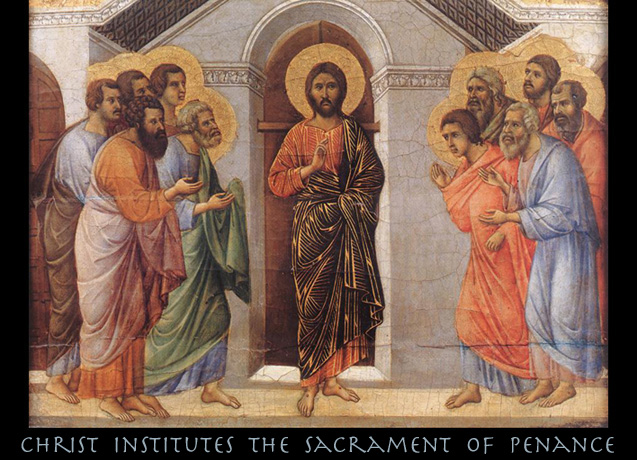
"Now when it was late that same day, the first of the week, and the doors were shut, where the disciples were gathered together, for fear of the Jews, Jesus came and stood in the midst, and said to them: Peace be to you. . . . As the Father hath sent me, I also send you. When he had said this, he breathed on them; and he said to them: Receive ye the Holy Ghost. Whose sins you shall forgive, they are forgiven them; and whose sins you shall retain, they are retained."
John 20, 19-23
Examination of Conscience
The simplest method of examination of a
conscience is to recall the different commandments
of God and the teachings of the Church;
and see in what way and how often we may have
broken them. It is also useful to recall the
seven deadly sins and our predominant passion
and bad habits. We should also notice in what
way we may have neglected the duties of our
state of life. We must bear in mind that we
may fall into sin either by thought, word, deed
or omission. Our ruling passion is the chief
cause of our sins.
We are bound to take prudent measures and ordinary care, without scrupulosity, to discover all our mortal sins before entering the tribunal of penance. In case it is our first confession we must examine our lives since we came to the use of reason. Ordinarily, we are bound to confess only the sins we have committed since our last good confession. Occasionally, following the advice of our confessor, it will be useful or perhaps necessary to make a general confession.
To help the memory it will be well to call to mind the places we have frequented, the persons in whose company we were, the things we have done and said, and the manner in which we have passed our time from day to day.
If we cannot tell how often we have committed any sin we should at least be able to say how long the habit lasted, and how often in a day or a week we usually fell into it.
The sins we should most carefully recall to mind in confession are mortal sins and habitual venial sins, as a sin in itself venial may become mortal by repetition, as in matters of justice, where thefts of small sums may by repetition become grave. Acts of faith, hope, charity and contrition should be made immediately before confession.
We are bound to take prudent measures and ordinary care, without scrupulosity, to discover all our mortal sins before entering the tribunal of penance. In case it is our first confession we must examine our lives since we came to the use of reason. Ordinarily, we are bound to confess only the sins we have committed since our last good confession. Occasionally, following the advice of our confessor, it will be useful or perhaps necessary to make a general confession.
To help the memory it will be well to call to mind the places we have frequented, the persons in whose company we were, the things we have done and said, and the manner in which we have passed our time from day to day.
If we cannot tell how often we have committed any sin we should at least be able to say how long the habit lasted, and how often in a day or a week we usually fell into it.
The sins we should most carefully recall to mind in confession are mortal sins and habitual venial sins, as a sin in itself venial may become mortal by repetition, as in matters of justice, where thefts of small sums may by repetition become grave. Acts of faith, hope, charity and contrition should be made immediately before confession.
|
Preparation for Confession |
Examination of Conscience |
Ritual of the Sacrament of Penance |
|
After Confession |
Council of Trent: The 10 Commandments |
Related Links from our site |
http://catholicharboroffaithandmorals.com/